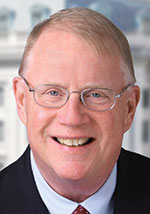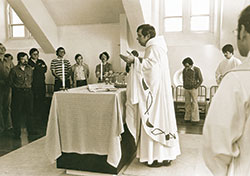Reflection / Daniel Conway
Archbishop Buechlein: a teacher, a leader, a friend
 I had the privilege of helping Indianapolis Archbishop Emeritus Daniel M. Buechlein write his memoirs, which were published by The Criterion Press in 2012 as Surprised by Grace: Memories and Reflections After Twenty-Five Years of Episcopal Ministry.
I had the privilege of helping Indianapolis Archbishop Emeritus Daniel M. Buechlein write his memoirs, which were published by The Criterion Press in 2012 as Surprised by Grace: Memories and Reflections After Twenty-Five Years of Episcopal Ministry.
It was a deeply moving experience for me, an experience which recalled images, conversations and shared insights from more than four decades of close association with this gifted man.
I first met Father Daniel (as he was known then) more than 50 years ago in August 1967 when I was a freshman at the former Saint Meinrad College in southern Indiana. He was assistant dean of students and lived on the fourth floor of St. Bede Hall with us freshmen. He was an extremely popular spiritual director, and the waiting area outside his combined office and room was always full of students waiting to see him.
That school year (1967-68), Father Daniel taught us a course on the history of philosophy. It was not his area of expertise. (He had studied liturgy in Rome following his ordination to the priesthood.) And he freely admitted that he was just one or two chapters ahead of us in our textbook. Later, he taught me courses on liturgy and the sacraments, and I was amazed at his insights and understanding of the changes taking place in those turbulent times.
It was clear that he welcomed the changes inspired by the Second Vatican Council—provided that they faithfully preserved the substance of the Church’s worship and belief.

Then-Benedictine Father Daniel Buechlein celebrates Mass at Saint Meinrad Seminary and School of Theology in St. Meinrad in this undated photo. He served as its president-rector from 1971-87 and was previously a member of its faculty and administrative staff. (Photo courtesy of Saint Meinrad Archabbey)
Although he was a relatively young monk in the late 1960s and early 1970s, he was quickly given positions of authority—first as director of spiritual formation of Saint Meinrad College and then as president-rector of Saint Meinrad Seminary and School of Theology. He proved to be a good steward of these important responsibilities and an excellent pastoral leader. Father Daniel frequently told us that his first responsibility as a monk and priest, and as a seminary administrator, was to be a man of prayer.
I remember serving a private Mass for him at one of the side altars in the Archabbey Church of Our Lady of Einseideln at Saint Meinrad before it was renovated. His intense devotion to the mystery of the Eucharist was powerfully communicated to me then, and it was affirmed many times over the years as I attended countless public and private liturgies that he celebrated as a priest and then as a bishop. I can honestly say that although he was a very private man, his intense, intimate love for Christ was evident whenever he prayed, but especially at Mass.
Archbishop Daniel was a man of prayer, first and foremost. But he was also a skilled administrator, a great pastoral leader.
I have said that he was an intensely private man—probably “off the chart” when it came to introversion. Given a choice between being alone or with or few friends and meeting with crowds of people, there was never any question which he preferred. And yet, he knew his duty—his public role first as a seminary rector and then as a bishop.
He worked hard at being a better public presence, improving his skill as a preacher and a public speaker. Although it did not come to him naturally (or with ease), he learned to “work the crowd” at gatherings of clergy, religious and lay leaders. He knew how important personal contact is, and he was determined to be a genuine pastoral presence in the seminary and in the two dioceses he served as bishop, Memphis and Indianapolis.
I worked closely with Father Daniel as director of development at Saint Meinrad and, later, when he became archbishop of Indianapolis, as secretary for planning, communications and development. He wasn’t always easy to work for because he set incredibly high standards and demanded excellence. But I always knew what he wanted, and where I stood, in doing my job.
Archbishop Daniel was a master at surrounding himself with people who could work together to carry out the Church’s mission. He informed us, he inspired us and he involved us in his ministry as the chief pastor of the archdiocese. Then he let us alone. (“No delegating up” was one of his favorite expressions.)
He never micromanaged us, but he set clear expectations and was always there for us if we needed him. I believe this was his greatest gift as a pastoral leader. Combined with his absolute commitment to prayer and worship, Archbishop Daniel’s leadership style “worked” beautifully.
In collaboration with his brother priests, his fellow religious women and men, and the lay faithful of west Tennessee and central and southern Indiana, he built up the Church in ways that were faithful both to authentic Catholic tradition and to the teaching of Vatican II.
Although poor health forced him to resign as archbishop a couple of years before his 75th birthday, his legacy is clear: He was a man of prayer. He was a skilled pastoral leader. And he was a devoted son, brother, confrere and friend.
May he rest in peace.
(Daniel Conway is a member of The Criterion’s editorial board.) †
 I had the privilege of helping Indianapolis Archbishop Emeritus Daniel M. Buechlein write his memoirs, which were published by The Criterion Press in 2012 as Surprised by Grace: Memories and Reflections After Twenty-Five Years of Episcopal Ministry.
I had the privilege of helping Indianapolis Archbishop Emeritus Daniel M. Buechlein write his memoirs, which were published by The Criterion Press in 2012 as Surprised by Grace: Memories and Reflections After Twenty-Five Years of Episcopal Ministry.